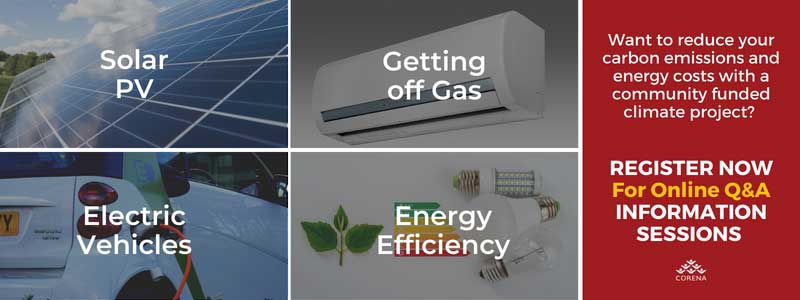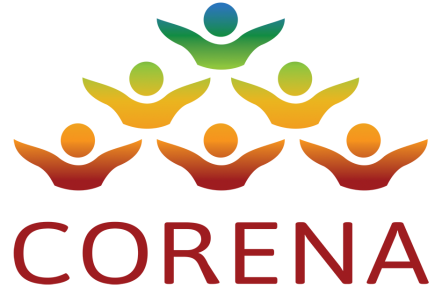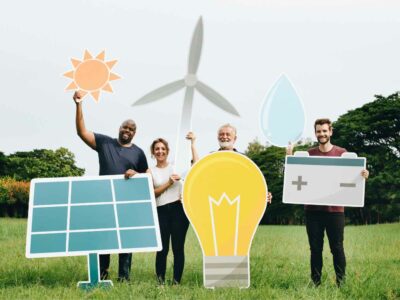Climate action requires the efforts of individuals, organisations, and governments if the world is to achieve its collective goal of net-zero carbon emissions. Fortunately, some communities are literally taking the power into their own hands and are banding together to create community renewable energy projects. These innovative community projects not only produce economies of scale in terms of energy production, carbon emission reductions and cost savings, but also pave the way for more unified, resilient, sustainable, and prosperous communities into the future.
What is Community Renewable Energy?
In a nutshell, community renewable energy involves citizens owning or participating in the consumption/production of green, sustainable energy.
Community renewable energy can be defined as any renewable energy initiative which is managed in an open and participatory way, while contributing positively to local and community decarbonisation, sustainability and social outcomes. Through doing this, people and their communities can democratically control their own energy needs and help plan for the future locally, as well as in some cases working with others regionally, and even nationally.
Community renewable energy projects can take a number of forms but normally include some or all of the following:
- Local production, delivery, and use of renewable energy
- Local ownership of generation assets
- Bulk purchase of solar panels (the top renewable energy source), hot water systems or other energy efficient products
- Community batteries
- Revolving energy funds (like ours!)
- Advocacy to governments, network operators and energy companies to remove barriers to action
Citizens who champion community energy projects might be concerned about climate change, rising energy prices or energy sovereignty. They are often sick of waiting for governments to act and wish to take action in a practical and tangible way. CORENA is an excellent example of community renewable energy in action.
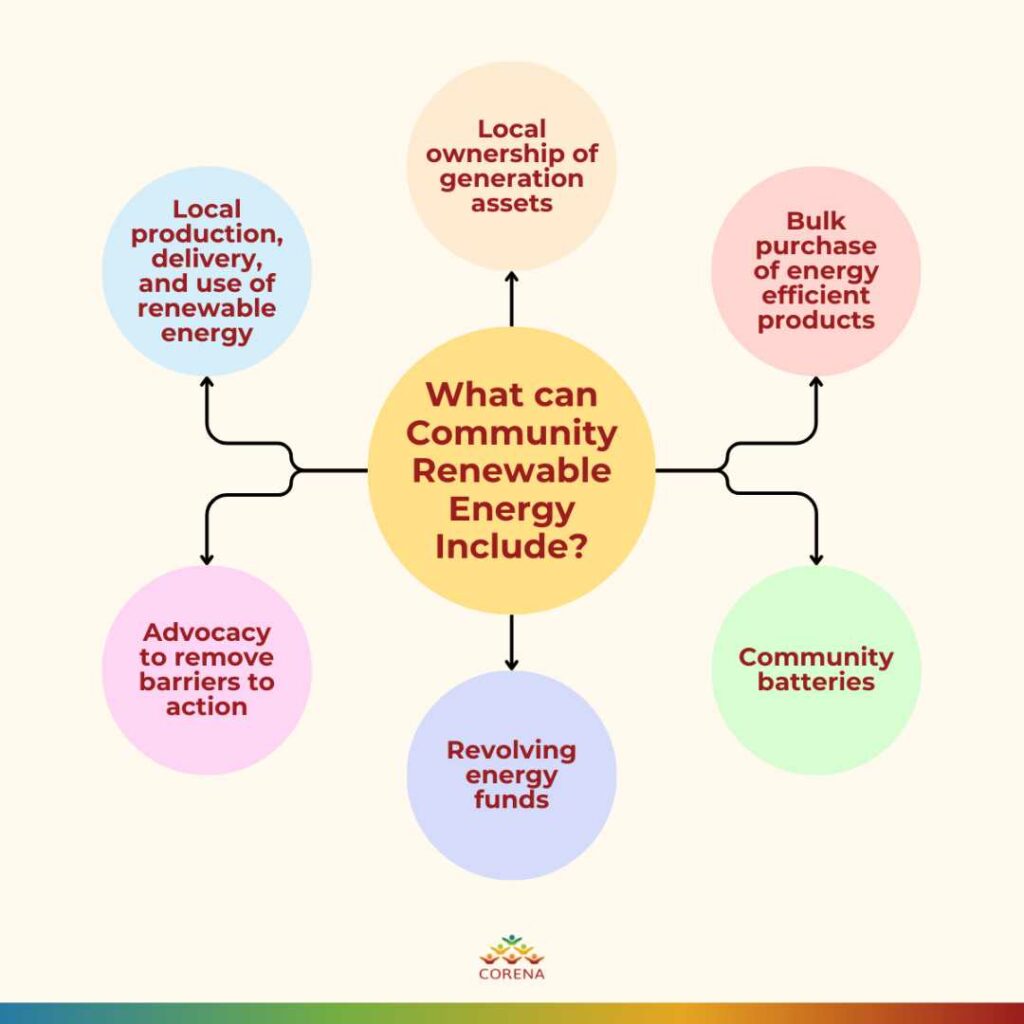
Why is community energy important?
Community energy involving renewable energy projects can empower community members to not only tackle the climate emergency, but also play an integral part in society’s transition to a more sustainable lifestyle and economy. Based on cooperation, and a shared vision, it can lead to stronger communities and contribute towards improving energy independence, security, cost savings, and even help promote sustainable development.
Community Energy Social Benefits
Community renewable energy projects can also be beneficial to communities by helping to:
- Improve climate resilience
- Increase energy equity & accessibility
- Provide employment & upskilling
- Facilitate new business opportunities
The recent Community Energy Collective Impact report prepared by the Community Power Agency, University of Technology Sydney and University of Melbourne found community energy groups had;
- Raised $86.8 million in funding for community energy infrastructure;
- Produced over 19,000 MWh of clean energy – enough for 2,800 homes for a year; and
- Avoided 13,947 tonnes of CO2-e, – equivalent to removing 7,748 cars from the road for a year.
How To Build A Community Energy Project
Before anything else, it’s important to take an inventory of any existing energy assets, systems, and other resources. If you are including individual buildings within your project it is useful to complete an energy audit.
1. Emissions & Energy Profile
Creating an emissions or energy use profile of your community can be a great place to start to work out where your efforts are best aimed.
Luckily there is a fantastic tool available which has done the hard work for you called Snapshot Climate. All you have to do is search for your local municipality or postcode and it gives you a detailed modelled breakdown of carbon emissions in your community. This profile shows your highest emitting sectors so you can prioritise your efforts.
2. Energy Inventory (Current System)
Identifying assets within the community or within adjacent ones can help to pinpoint anything which is under-utilised and could potentially be integrated into a community energy project. These types of resources can include:
- Roof space
- Available land
- Heating systems (community pools, civic buildings, schools, clinics, etc…)
- Back-up generation (as above)
- Local skills and expertise.
3. Create a Plan of Action
A short plan of action containing the most effective and practical actions is a great way to get everyone on the same page.
To get ideas head to the Coalition for Community Energy website – the peak body for community energy groups in Australia. They have a Knowledge Hub with webinars, articles and guides developed by experts that cover a wide range of general topics including how to establish a project and engage your community.
You can also gain lots of inspiration from Electrify 2515’s website, a group on a mission to make their postcode all electric.
Your group might want to start with something simple such as providing workshops or education materials to the community and then move on to coordinating residents for a bulk buy of hot water systems or electric vehicles. If you are looking to work towards your own energy generation infrastructure you could contact other community energy groups who have successfully done this.
If you would like to set up your own revolving energy fund CORENA is happy to share our experiences doing this so feel free to get in contact. Alternatively many community energy groups approach local non profits and recommend them to CORENA for a zero interest loan. An example of this was our project with Merriwa Industries. We have created a number of resources you can use to help you do this here (scroll down to the “Spread the Word” section at the bottom of the page.)
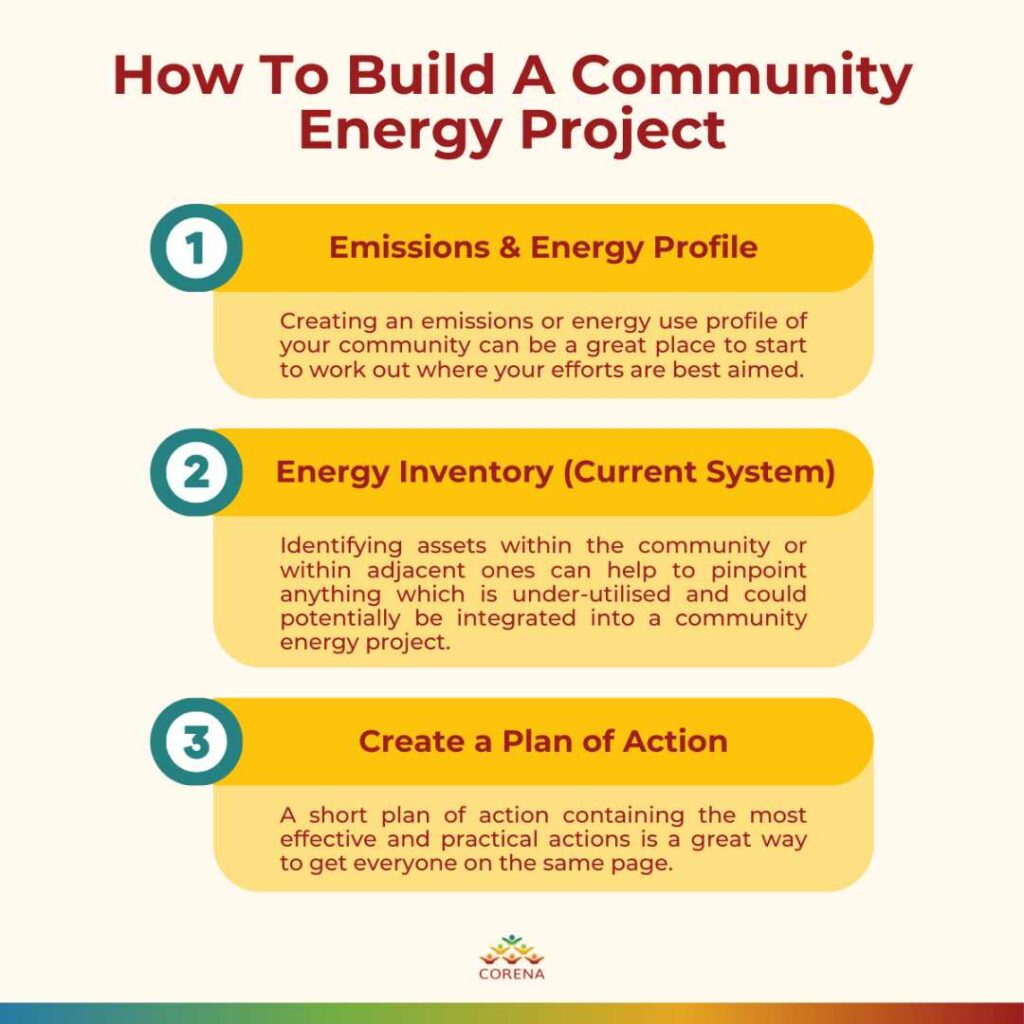
Be Part of Australia’s Community Energy Future
Here at CORENA, we provide an innovative revolving fund model that helps finance non profits and community organisations who wish to reduce their carbon footprint and improve their energy efficiency, but cannot afford the upfront expense. Our revolving fund ensures that these kinds of climate projects get the funding that they need in order to get off the ground and become part of the renewable energy transition.
Through offering a zero-interest loan, it becomes easy to repay through the savings made on operating costs afforded by the low running costs of a renewable energy project over the long term.
Join Australia’s renewable energy revolution and help to finance projects in your community by donating to our revolving fund. We play a role in supporting all kinds of community climate and renewable energy projects.
Interest Free Renewable Energy Loans For Non Profits, Community Organisations, Charities, & Social Enterprises
CORENA, can provide free technical advice and zero interest funding to qualifying organisations and communities looking to reduce their emissions and green their energy consumption.
Donations help us to provide funding to non profit and community organisations for:
- Solar Panels
- Energy Efficiency – such as switching to efficient alternatives or installing insulation
- Getting Off Gas – Replacement of fossil gas appliances with electric alternatives
- Electric Vehicles
- A combination of the above
No interest is paid on CORENA loans, and the quarterly loan repayments are set to be a little less than the savings on operating costs averaged over a year. This means never being out of pocket for upfront costs. After the loan is fully repaid, loan recipients reap the full financial benefit of having lower energy costs.
Learn more in 5 Ways CORENA Helps Non Profits Reduce Carbon Emissions & Energy Costs
To learn more, check out how to apply for a loan, or register for one of our upcoming Online Q&A Information Sessions.
